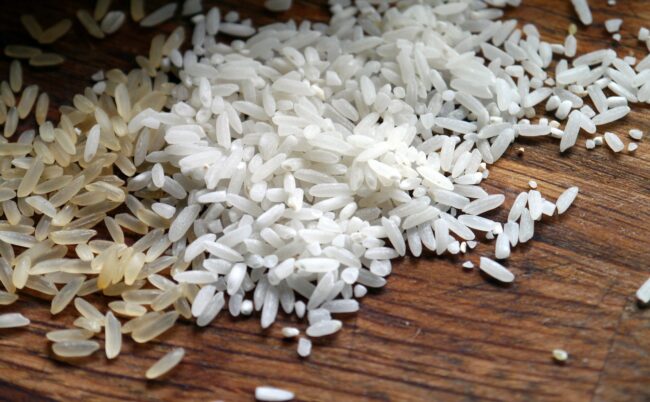Table of Contents
As a pet parent, you probably want to feed your dog healthy snacks and meals. Not all owners know exactly which foods are safe so it’s great to do some research to find the tastiest and safest options for your dog. Merely feeding anything or too much human food can lead to gastrointestinal problems for your dog.
So, can dogs eat jasmine rice? The answer to your question is yes. Dogs can eat jasmine rice! But in what amount? And in what way? Are there any side effects associated with eating too much of this rice? This article will answer all of your questions so you can decide whether jasmine rice should become a part of your pet’s diet.
What is Jasmine Rice?
Jasmine rice is a long-grain variety of rice. It is also known as aromatic rice due to its fragrance. Jasmine rice is soft and sticky, and very nutritious. We find it in two basic forms – white and brown.
White vs. Brown Jasmine Rice
While white jasmine rice is non-coated, brown rice is coated. This coat contains major nutrients, making it more nutritious in comparison to white rice. At the same time, it is not easy for our furry friends to digest the coated variety properly.
Therefore, experts recommend white rice for dogs. Brown rice may lead to stomach troubles.
White jasmine rice has a high glycemic index. This may lead to high sugar levels. Therefore, rice is not recommended for dogs with diabetes.
Benefits of Jasmine Rice
Jasmine rice is beneficial for dogs if they are suffering from diarrhea. Rice is palatable, easy to chew, and also easy to digest. Doctors recommend feeding white rice if the dog is suffering from gastrointestinal problems.
- Rice in moderation can treat diarrhea and upset stomach. However, if taken in excess, it can upset the stomach further.
- Rice, when combined with chicken, can add to the nutritional content of your dog’s diet.
- Also, jasmine rice, unlike other rice varieties, is rich in thiamine, protein, and iron. It is also low in cholesterol and saturated fat.
- It provides fiber, which is good for the pup’s digestive system.
- It also provides vitamin B, which may be ordinarily missing from your pet’s diet.
How Much Can Dogs Eat?
Eating anything in excess is bad. Moderation is key, especially when it comes to food items. Rice is good for dogs when it constitutes a part of a balanced diet. However, if only rice is served, then it may lead to a deficiency of other nutrients.
Rice is rich in carbohydrates but low in proteins. Carbohydrates are required in the pup’s diet but our pets also need protein to stay healthy. Therefore, be sure not to overload your dog’s diet with carbohydrates.
Rice in excess can lead to an upset stomach. It should comprise only 10 percent of your dog’s food intake. Add other ingredients like chicken or pumpkin to make the meal more balanced and appealing to your pet.
How To Give Jasmine Rice To Dogs
When it comes to feeding any food, preparation is important. The same food can become healthy or toxic, depending on how it was prepared.
When giving jasmine rice to dogs, make sure to prepare it as blandly as possible. Simply boil it and do not add anything, not even salt, to the water. Once the rice is well-cooked, start off by feeding your dog a small portion. You can increase it with every meal to give your pet’s digestive system a chance to adapt.
Once again, the rice should not be the main course – unless your vet prescribes it as such to treat diarrhea.
Side Effects
Normally, there should be no side effects caused by eating jasmine rice. However, excess consumption of this rice may lead to an upset stomach.
Further, if your dog is allergic to rice, then you must not feed them any variety of rice. Some symptoms of allergies include:
- Loss of hair
- Itching of skin
- Upset stomach
- Infection
In case you notice any of these allergic reactions, make an immediate appointment at your nearest pet clinic.
My Dog Is Unable To Digest Rice?
Jasmine Rice is easily digestible. So, ordinarily, there should be no problem digesting this variety.
However, if your dog is unable to digest rice, then it means that your dog has a sensitive stomach. You should check with your vet if this is normal. The vet shall be able to give you more advice.
In most cases, it’s better to replace rice with pumpkin. There are other alternatives for rice as well that may fulfill the nutritional needs of your dog.
Also, note that white jasmine rice is better for dogs than brown jasmine rice. Brown rice is unprocessed, unlike white rice. It is, therefore, difficult to digest. So, if your dog is unable to digest brown jasmine rice, make sure to replace it with white jasmine rice.
A Quick Summary
Dogs can eat jasmine rice. In fact, it’s quite beneficial for dogs when taken in moderation. White jasmine rice is better for pooches because dogs struggle to digest the unprocessed, brown variety. Avoid rice if your dog is allergic to rice or if it causes an upset stomach. But in general, when consumed in moderation, boiled jasmine rice can add extra nutrients and also help keep your dog’s tummy healthy.

